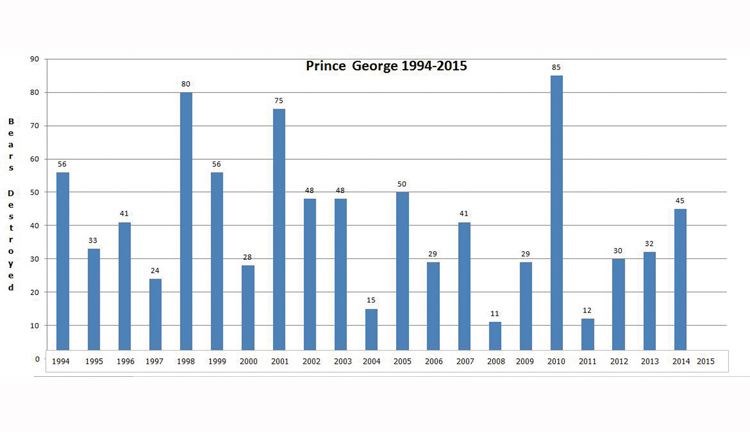The city's bears are being destroyed in the name of public safety in far fewer numbers this year.
Only about 20 have been shot by Conservation Officers inside municipal borders so far this year, according to the data collected by the Northern Bear Awareness Society. That is still a score too high for the liking of Dave Bakker with the society.
"We've had two years in a row, now, of abundant natural food sources: berries, poplar buds, the grasses they like, so it's kept things on an even keel in the forest. Less coming into town," he said, but what he said next was a warning.
"That is starting to wane. We are into the onset of fall and those natural food sources are going to grow more and more scarce as they pack it on for winter. Everything could change if people don't go to that extra effort to clean up their attractants."
Bears will come into yards and wander down residential streets following their sensitive noses. They are most prone to come into human contact as they seek out primary sources like insecure garbage, unattended fruit and berries, unclean barbecues, easy-access bird feeders. All of these things are caused by humans and need not be a factor.
People can prevent encounters this time of year by:
Keeping household garbage inside locked sheds and garages (dispose of it frequently if you are not in a garbage pickup area of the city).
Brush and burn barbecue grills to keep it free of oils and food residue;
Suspend bird feeders out of bears' reach and constantly clean the ground below for seed droppings.
Pick all fruit and berries as soon as they are ripe, and constantly clean the ground free from fallen morsels.
Some additional measures should also be taken if applicable to your home, like never leaving pet food dishes outside overnight, never add meat products to compost bins and be diligent about turning over compost materials, and use electric fencing around domestic farm facilities like bird coops, goat pens, livestock barns, bee hives or fruit and berry groves.
What Bakker doesn't want is a repeat of 2010, the worst year on record in his research of the last 20 years of statistics.
There were 85 bears killed that year, following more than 1,800 complaint calls.
Seventy-five were killed in 2001 and 80 in 1998.
Compare that with 2008 when only 11 bears were put down, 12 in 2011 and 15 in 2004 as the more positive benchmark years.
Since 1994, the average numbers for Prince George are 800 complaint calls per year leading to 40 bear deaths per year.
"It is everyone's responsibility to ensure bears don't have to be destroyed for public safety," said a statement issued this week by the Ministry of Environment. "Communities where attractants are managed properly, such as Bear Smart communities, have seen significant declines in bear conflict calls, and the number of bears destroyed. Kamloops, Squamish, Whistler, Lions Bay, Port Alberni, Naramata and New Denver are designated Bear Smart."
The Northern Bear Awareness Society is working towards Prince George joining that roster of official Bear Smart communities.
For more information on the society, visit their Facebook Page under the Northern Bear Awareness Society full title.
They are also involved in the Prince George Fruit Exchange page on Facebook as it facilitates the citywide removal of unwanted fruit, giving it a productive purpose like feeding hungry people in the city, providing it to Northern Lights Estate Winery for their fundraiser wine, or shipping it to Smithers to feed the rescue bears at Northern Lights Wildlife Society.
To report a human-wildlife interaction, please call the Report All Poachers and Polluters (RAPP) hotline at 1-877-952-7277 (RAPP).



